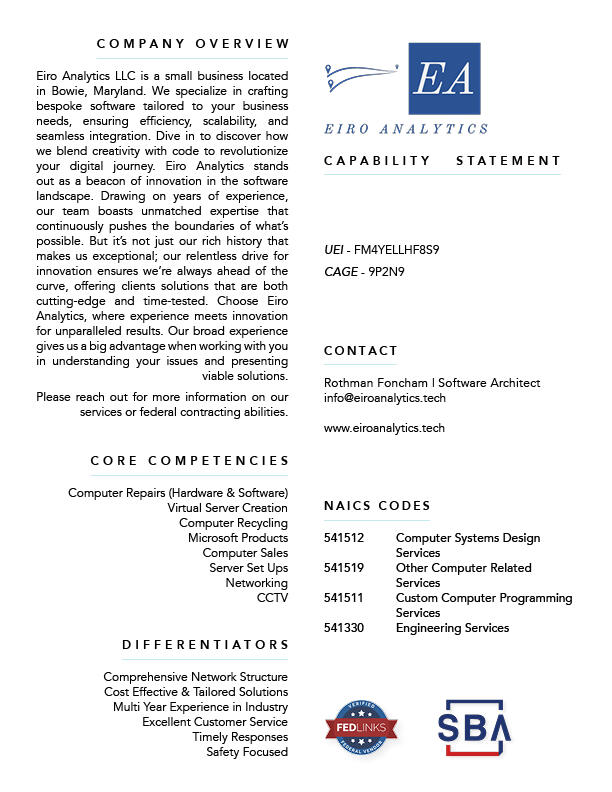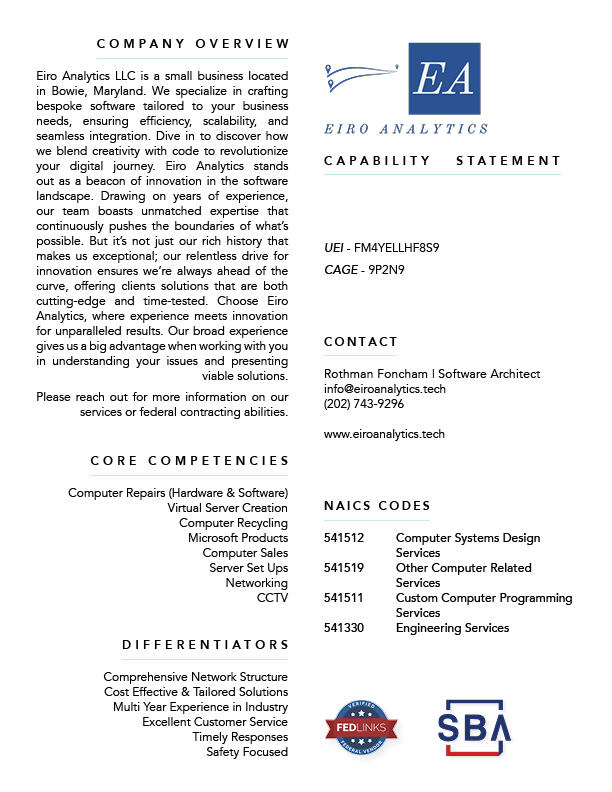
Transforming Data into Decisions.
We specialize in crafting bespoke software tailored to your business needs, ensuring efficiency, scalability, and seamless integration. Dive in to discover how we blend creativity with code to revolutionize your digital journey.

Why Eiro Analytics
Eiro Analytics stands out as a beacon of innovation in the software landscape. Drawing on years of experience, our team boasts unmatched expertise that continuously pushes the boundaries of what's possible. But it's not just our rich history that makes us exceptional; our relentless drive for innovation ensures we're always ahead of the curve, offering clients solutions that are both cutting-edge and time-tested. Choose Eiro Analytics, where experience meets innovation for unparalleled results.
How We Work With clients
At Eiro Analytics, collaboration is at the heart of every project. We believe that the best outcomes arise from a genuine partnership with our clients. From initial consultation to the final product, our team works hand-in-hand with you, blending your industry insights with our technical expertise. Together, we ensure that each solution is tailored, efficient, and directly aligned with your goals, fostering a shared commitment to success.
Our Core Values
Client Value Creation
Beyond service delivery, it's about understanding, anticipating, and exceeding expectations. When clients thrive, we succeed.
Global Network
Bridging cultures and industries, fueling knowledge and innovation in our interconnected world.
Integrity
Integrity is our currency: building trust, ensuring transparency, and guaranteeing consistent delivery for lasting success.
"Harness the power of tech, and shape the future."
Services

Data collection and integration
Foundational steps in transforming disparate information sources into a unified, actionable insight for informed decision-making.

Real-time analytics
Provides instant insights from data as it's generated, enabling businesses to make swift and informed decisions on the fly.

Data visualization
Transforms complex datasets into intuitive graphics, enabling clearer comprehension and more informed decision-making.

Risk analytics
Employs data techniques to forecast and mitigate potential threats, ensuring businesses stay proactive in a volatile landscape.
Eiro Analytics is prepared for government contracting on the local, state, and federal sectors.
Eiro Analytics is well-prepared to secure government contracts with its robust capabilities and commitment to delivering high-quality services. The company's readiness is exemplified by its CAGE code, 9P2N9, and its UEI, FM4YELLHF8S9, ensuring seamless engagement with government agencies and meeting their stringent requirements.
Capability Statement

Leveraging AI with Analytics
In the rapidly evolving landscape of technology and innovation, the collaboration between humans and artificial intelligence (AI) has emerged as a pivotal force reshaping industries, economies, and societies. One of the driving forces behind this transformation is the abundance of data. Data, often referred to as the new oil, has become the lifeblood of AI, fueling its capabilities and enabling unprecedented collaboration between humans and machines. In this article, we will explore the ways in which data can be implemented to foster increased collaboration between humans and AI.The Power of DataData is the foundation upon which AI systems are built. It serves as the raw material that AI algorithms use to learn, adapt, and make decisions. The more data an AI system has access to, the better it can understand patterns, make predictions, and provide valuable insights. Data-driven AI has the potential to revolutionize virtually every industry, from healthcare and finance to manufacturing and entertainment.Enhancing Decision-MakingOne of the primary ways data can be implemented to increase collaboration between humans and AI is by enhancing decision-making. In fields like healthcare, AI algorithms can analyze vast amounts of patient data to assist doctors in diagnosing diseases, predicting outcomes, and recommending treatment options. This collaboration between human expertise and AI's analytical capabilities results in more accurate and personalized healthcare decisions, ultimately saving lives.In finance, data-driven AI algorithms can assess market trends and economic indicators, helping investors make informed decisions about their portfolios. These algorithms can process real-time data, news, and social media sentiment to provide valuable insights to traders and financial analysts, creating a symbiotic relationship between human intuition and AI's data-driven analysis.Automating Routine TasksData-driven AI can also be harnessed to automate routine and repetitive tasks, freeing up human workers to focus on more creative and strategic aspects of their jobs. In industries such as manufacturing and logistics, AI-powered robots and drones equipped with sensors can collect and process data to optimize production processes, monitor inventory, and even perform maintenance tasks. This increased automation not only improves efficiency but also reduces the risk of human errors.In customer service, chatbots and virtual assistants powered by AI can handle routine inquiries and transactions, leaving human customer support agents to handle more complex and emotionally sensitive interactions. This combination of AI automation and human expertise improves customer satisfaction and reduces operational costs.Personalizing User ExperiencesData-driven AI has revolutionized the way businesses interact with their customers. By collecting and analyzing customer data, companies can create highly personalized user experiences. For example, e-commerce platforms can use AI algorithms to recommend products based on a customer's browsing and purchase history, increasing the likelihood of making a sale.Streaming services like Netflix and Spotify leverage user data to curate personalized content recommendations. These recommendations are generated by AI algorithms that analyze a user's viewing or listening history, preferences, and behavior patterns, ensuring that customers are exposed to content that resonates with their individual tastes.Improving Predictive AnalyticsPredictive analytics, powered by AI and data, enable organizations to anticipate future trends and events. In the field of supply chain management, businesses can use historical sales data, weather forecasts, and transportation data to optimize inventory levels, reduce costs, and improve delivery times. This level of data-driven precision allows companies to respond swiftly to changes in demand and market conditions.In the energy sector, predictive maintenance powered by AI and sensor data helps identify equipment failures before they occur, preventing costly downtime and ensuring the reliable operation of critical infrastructure. These predictive capabilities are the result of close collaboration between human domain experts and AI algorithms that analyze massive datasets.Challenges and ConsiderationsWhile the collaboration between humans and AI through data is promising, it also presents several challenges and considerations.Data Privacy and SecurityThe collection and use of vast amounts of data raise concerns about privacy and security. Protecting sensitive information and ensuring that data is used responsibly are critical considerations. Regulations like the General Data Protection Regulation (GDPR) and the California Consumer Privacy Act (CCPA) have been introduced to address these concerns and give individuals greater control over their data.Bias and FairnessAI systems are only as good as the data they are trained on. Biased or incomplete data can lead to biased AI algorithms, perpetuating discrimination and inequality. Addressing bias and ensuring fairness in AI systems is an ongoing challenge that requires careful curation of training data and ongoing monitoring of AI algorithms.Ethical ConsiderationsThe use of AI in decision-making, especially in critical domains like healthcare and criminal justice, raises ethical questions about accountability, transparency, and the potential for unintended consequences. Striking the right balance between human judgment and AI recommendations is an important ethical consideration.Skill DevelopmentAs AI becomes more integrated into various industries, there is a growing need for individuals to acquire new skills. Both workers and organizations must invest in training and upskilling to harness the full potential of data-driven AI collaboration.In conclusion increased collaboration between humans and AI through data is reshaping our world, offering the promise of improved decision-making, automation of routine tasks, personalized user experiences, and enhanced predictive analytics. However, this collaboration also comes with challenges related to data privacy, bias, ethics, and skill development. As we navigate this transformative era, it is essential to strike a balance that harnesses the power of AI while upholding ethical principles and ensuring that the benefits of this collaboration are distributed equitably across society. Ultimately, the synergy between humans and AI, fueled by data, has the potential to drive innovation and positive change across diverse industries and sectors.
Let's Connect
Feel free to reach out to schedule a discovery meeting. We would like to learn more about your organization, the challenges you face, and how data can help you. Please fill out the form below.
Let's Connect
Feel free to reach out to schedule a discovery meeting. We would like to learn more about your organization, the challenges you face, and how data can help you. Please fill out the form below.
Thank You
Congratulations! You have taken the first steps in implementing data analytics into your organization. Someone from our team will be reaching out within 48 hours. We appreciate your patience and cannot wait to assist you in moving forward!

